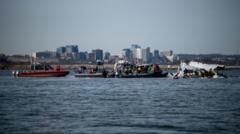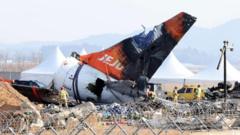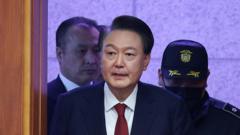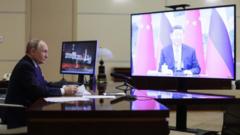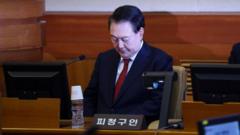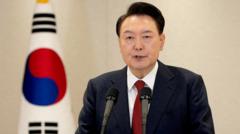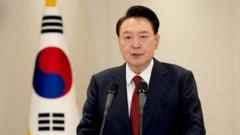In an unprecedented situation, South Korea's authorities aim to detain President Yoon Suk Yeol as tensions escalate over his impeachment and martial law declaration.
**South Korea's President Yoon Suk Yeol Faces Renewed Detention Attempt Amid Ongoing Turmoil**

**South Korea's President Yoon Suk Yeol Faces Renewed Detention Attempt Amid Ongoing Turmoil**
Investigators gear up for a second try to question the impeached leader linked to martial law allegations.
In an intense standoff, South Korean investigators are preparing their second attempt to detain President Yoon Suk Yeol, who remains barricaded in the presidential compound since his impeachment on December 14, 2024. A barrage of police units, expected to number over 1,000, will be deployed to enforce a court-issued warrant for questioning Yoon regarding his controversial imposition of martial law last month.
During a previous attempt on January 3, investigators faced overwhelming resistance from Yoon's extensive security detail, which outnumbered them, forcing a retreat after a prolonged standoff. As they gear up for this fresh operation, the security around Yoon’s residence has intensified, with reinforced barriers and additional measures being taken to avert officials from executing the warrant.
This situation marks a historic moment for South Korea as the authorities seek to apprehend a sitting president, a first since the nation embraced democracy in the late 1980s. The public's engagement is high, with news outlets and social media closely monitoring the developments, raising concerns about potential violent confrontations.
Meanwhile, the Constitutional Court is deliberating on whether to confirm Yoon's removal from office, with the president's absence sparking speculation he fears arrest. His legal team indicates he regards the warrant as unjust and plans to resist any actions to detain him.
As both sides prepare for a showdown, the possibility of violence looms, with the nation poised on the edge of a political precipice. This critical moment in South Korea's democratic landscape represents the growing tension between law enforcement and political leadership in an unprecedented challenge to authority and stability.
During a previous attempt on January 3, investigators faced overwhelming resistance from Yoon's extensive security detail, which outnumbered them, forcing a retreat after a prolonged standoff. As they gear up for this fresh operation, the security around Yoon’s residence has intensified, with reinforced barriers and additional measures being taken to avert officials from executing the warrant.
This situation marks a historic moment for South Korea as the authorities seek to apprehend a sitting president, a first since the nation embraced democracy in the late 1980s. The public's engagement is high, with news outlets and social media closely monitoring the developments, raising concerns about potential violent confrontations.
Meanwhile, the Constitutional Court is deliberating on whether to confirm Yoon's removal from office, with the president's absence sparking speculation he fears arrest. His legal team indicates he regards the warrant as unjust and plans to resist any actions to detain him.
As both sides prepare for a showdown, the possibility of violence looms, with the nation poised on the edge of a political precipice. This critical moment in South Korea's democratic landscape represents the growing tension between law enforcement and political leadership in an unprecedented challenge to authority and stability.

